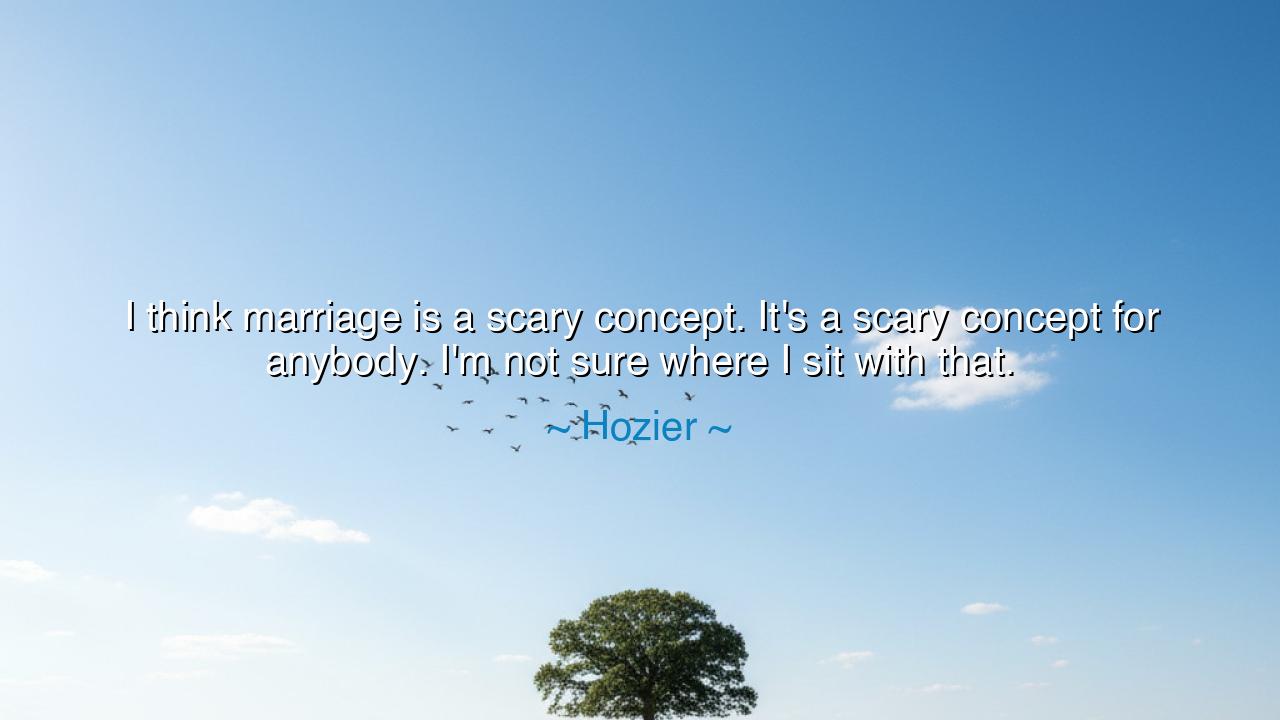
I think marriage is a scary concept. It's a scary concept for
I think marriage is a scary concept. It's a scary concept for anybody. I'm not sure where I sit with that.






When Hozier confessed, “I think marriage is a scary concept. It’s a scary concept for anybody. I’m not sure where I sit with that,” he was speaking with the honesty of one who gazes deeply into the mysteries of love and commitment and does not pretend to have mastered them. His words are not cynical, but reflective — the voice of a poet who understands that love, in its truest form, is both a blessing and a trial. For marriage, that ancient covenant, is not merely a union of hearts but a binding of souls — an agreement not just for joy, but for endurance. In calling it “scary,” Hozier touches upon the awe and trembling that have always accompanied the sacred act of two lives becoming one.
The origin of this quote arises from Hozier’s interviews in the wake of his music’s rise to fame, where he often reflected on the complexities of love, faith, and human connection. A man deeply attuned to both spirituality and doubt, he approached marriage not as a social expectation but as a profound moral and emotional responsibility. His uncertainty — “I’m not sure where I sit with that” — reveals a humility rare in the modern age: the recognition that commitment is not for the unexamined heart, and that to enter it blindly is to misunderstand its gravity. To Hozier, as to many before him, the concept of marriage evokes both beauty and fear — beauty for its promise of union, and fear for the vulnerability it demands.
To the ancients, this fear would not have been foreign. The Greeks spoke of Eros — love as divine madness — a force that lifts the soul to the heavens yet can also drive it to despair. In marriage, they saw both the possibility of harmony and the danger of ruin. Even the wisest among them, like Socrates, warned that no matter one’s choice — to marry or remain alone — one would surely face trials. Thus, Hozier’s reflection is not the hesitation of the weak, but the awareness of the wise: that every vow of love carries within it the weight of mortality, the test of time, and the courage to face both joy and suffering side by side.
Consider the story of Mary Wollstonecraft and William Godwin, two great thinkers of the Enlightenment. They both championed freedom of thought and individuality, and for years resisted marriage, fearing that it would chain the spirit and dull the flame of love. Yet when Wollstonecraft became pregnant, they chose to wed, seeking to legitimize their bond in the eyes of society. Their marriage, though brief — ended by her untimely death — was marked by deep intellectual and emotional connection. Godwin later wrote that their union, despite its fears and contradictions, revealed the sublimity of love when it transcends convention. Their story echoes Hozier’s sentiment: that marriage is terrifying not because it is flawed, but because it demands everything — mind, body, and soul.
Hozier’s words also reflect the modern tension between freedom and permanence. In a world where love often burns fast and fades quickly, the notion of forever can seem both beautiful and impossible. To commit one’s life to another is to surrender a part of one’s independence, to gamble one’s future on trust and faith. For an artist like Hozier — who writes of sin and salvation, of the divine within desire — marriage becomes a mirror of humanity’s eternal struggle: the yearning for connection and the fear of losing oneself within it. To call marriage “scary” is to admit that love, when real, exposes the deepest vulnerabilities of the human soul.
Yet there is also honor in this fear. The ancient sages taught that fear often walks beside reverence. Just as one trembles before the sacred, so too should one approach love with humility. The fear of marriage is not cowardice, but the recognition that true union requires the death of selfishness and the birth of shared purpose. To join one’s fate to another’s is to walk into the unknown, trusting that love will be enough to light the path. That is no small thing — and Hozier’s hesitation is, in its own way, an act of respect for what marriage truly means.
Let this be the lesson carried forward: do not rush to bind what has not yet been understood. Marriage, like any great covenant, should be entered not from fear of loneliness or desire for stability, but from courage — the courage to grow, to forgive, to endure. Hozier’s words teach us that love is not diminished by fear, but refined by it. The one who trembles before commitment is the one who truly grasps its sacredness. For only by acknowledging the weight of love can one hope to carry it well. And so, as the ancients would say: let the heart fear, but let it not flee — for within that trembling lies the doorway to the divine.






AAdministratorAdministrator
Welcome, honored guests. Please leave a comment, we will respond soon